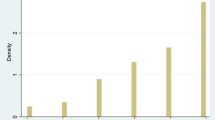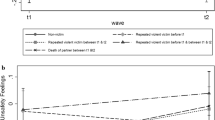Abstract
Crime hurts victims financially and often physically. This paper examines how individual well-being is affected by the direct experience of burglary and robbery, using micro-level happiness data from Japan. I find that the direct experience of burglary significantly reduces victims’ reported happiness. In monetary terms, being burglarized is as bad as losing approximately $35,000–$52,500. This paper also tests for heterogeneous effects of victimization on happiness. Happiness of the wealthy, who can afford to lose some money as well as buy some safety, is not affected by the direct experience of burglary or robbery. Crime victimization hurts homeowners more than renters most likely because their barriers to mobility make it difficult for homeowners to move in response to crime victimization. Finally, this paper suggests that victims’ psychological non-pecuniary costs are substantially larger than the pecuniary losses.
Similar content being viewed by others
Notes
The Japanese General Social Surveys are designed and carried out by the JGSS Research Center at Osaka University of Commerce (Joint Usage/Research Center for Japanese General Social Surveys accredited by Minister of Education, Culture, Sports, Science and Technology), in collaboration with the Institute of Social Science at the University of Tokyo.
While psychologists tend to make a distinction between happiness and life satisfaction, economists tend to use the terms interchangeably (Graham et al. 2004). Not surprisingly, answers to happiness and life satisfaction questions are closely correlated (Graham 2009), but Deaton (2008) argues that they are not necessarily synonyms..
The variables were originally ordered from 1 signifying “very happy” to 5 signifying “very unhappy” but have been reordered so that a higher value corresponds to a higher level of happiness.
See Frey and Stutzer (2001) for overviews of the economics of happiness.
There are 47 prefectures in Japan.
Though previous studies (Powdthavee 2005; Cohen 2008) discuss the role of local crime rates and analyze their contextual effects, the current study only focuses on actual individual victimization. The main reason is that I cannot match the individual with the municipal-level local crime rates because the JGSS does not contain information about which municipality within the prefecture the individual lives in. The prefecture-level crime rate is available, but a prefecture is a relatively wide geographic area. Within the same prefecture, it is likely that some areas have higher crime rates than others. Therefore, prefecture crime rates are not likely to be a good measure for local crime rates, and perhaps because of this reason, the local crime rate variable is never statistically significant in any of the results below. Cohen (2008) also finds that county-level crime rates have little effect on happiness in the United States.
For most OECD countries and the US, the minimum point is around 45 (Di Tella and MacCullock 2008).
Of course, the coefficients on the personal characteristics are not meant to capture the causal effect. For example, it may be that happier people are more likely to be married and earn more. But I am not interested in precisely establishing causality here for empirical determinants of happiness from personal characteristics.
Although I control for a great many characteristics of each respondent, the pseudo R-squared and adjusted R-squared are 0.03 and 0.08, respectively, meaning that these factors leave much of the variation (more than 90 %) in self-reported happiness unexplained. This is typical in the happiness economics literature, as much of the variation in happiness is due to a person’s disposition or personality, which is not captured in survey data and thus unobservable.
A referee pointed out that moving from the household income level of 7.5–8.5 million yen to 2.5–3.5 million yen is also roughly equivalent to moving from 2.5–3.5 million yen to 1.5–2.5 million yen (the differences in the size of the coefficients are 1.38 and 1.25, respectively). This larger difference in the coefficient on income at a lower income level is not particularly surprising because of diminishing marginal utility with income, that is, the effect of income on happiness tends to get smaller as income increases. Unfortunately, I am not able to perform a detailed analysis due to the nature of the categorical income variables. Although the amount of money needed to compensate victims varies depending on their income, it illustrates that, whether burglary victims’ income level is 2.5–3.5 million yen or 7.5–8.5 million yen, the compensating amount equals to a significant portion of income.
In the United States, the rate of victimization for property crimes rises modestly with household income while that for violent crimes declines with income (Freeman 1999).
The results are available upon request.
I thank a referee for pointing out this policy implication.
Criminal Statistics in 2002, National Police Agency of Japan.
References
Alesina, A., Di Tella, R., & MacCulloch, R. (2004). Inequality and happiness: Are Europeans and Americans different? Journal of Public Economics, 88(9–10), 2009–2042.
Becker, G. (1968). Crime and punishment: An economic approach. Journal of Political Economy, 76(2), 169–217.
Blanchflower, D. G., & Oswald, A. J. (2004). Well-being over time in Britain and the USA. Journal of Public Economics, 88(7–8), 1359–1386.
Bok, D. (2000). The politics of happiness: What government can learn from the new research on well-being. Princeton: Princeton University Press.
Clark, A. E. (2003). Unemployment as a social norm: Psychological evidence from panel data. Journal of Labor Economics, 21(2), 325–351.
Clark, A. E., & Oswald, A. J. (1994). Unhappiness and unemployment. Economic Journal, 104(424), 648–659.
Clark, A. E., & Oswald, A. J. (1996). Satisfaction and comparison income. Journal of Public Economics, 61(3), 359–381.
Cohen, M. A. (2008). The effect of crime on life satisfaction. The Journal of Legal Studies, 37(S2), S325–S353.
Cullen, J. B., & Levitt, S. (1999). Crime, urban flight, and the consequences for cities. The Review of Economics and Statistics, 81(2), 159–169.
Davies, S., & Hinks, T. (2010). Crime and happiness amongst heads of households in Malawi. Journal of Happiness Studies, 11(4), 457–476.
Deaton, A. (2008). Income, health, and well-being around the world: Evidence from the Gallup World Poll. Journal of Economic Perspectives, 22(2), 53–72.
Di Tella, R., & MacCullock, R. (2008). Gross national happiness as an answer to the Easterlin Paradox? Journal of Development Economics, 86(1), 22–42.
Di Tella, R., MacCullock, R., & Oswald, A. J. (2001). Preferences over inflation and unemployment: Evidence from surveys of happiness. American Economic Review, 91(1), 335–341.
DiPasquale, D., & Glaeser, E. L. (1999). Incentives and social capital: Are homeowners better citizens? Journal of Urban Economics, 45(2), 354–384.
Dugan, L. (1999). The effect of criminal victimization on a household’s moving decision. Criminology, 37(4), 903–930.
Easterlin, R. A. (2001). Income and happiness: Toward a unified theory. Economic Journal, 111(473), 465–484.
Freeman, R. B. (1999). The economics of crime. In O. Ashenfelter & D. Card (Eds.), Handbook of labor economics (Vol. 3c, chap. 52). Amsterdam, Netherlands: North Holland Publishers.
Frey, B. S. (2008). Happiness: A revolution in economics. Cambridge: The MIT Press.
Frey, B. S., & Stutzer, A. (2000). Happiness, economy and institutions. Economic Journal, 110(466), 918–938.
Frey, B. S., & Stutzer, A. (2001). Happiness and economics. Princeton: Princeton University Press.
Gould, E. D., Weinberg, B. A., & Mustard, D. B. (2002). Crime rates and local labor market opportunities in the United States: 1979–1997. The Review of Economics and Statistics, 84(1), 45–61.
Graham, C. (2009). Happiness around the world: The paradox of happy peasants and miserable Millionaires. New York: Oxford University Press.
Graham, C., Eggers, A., & Sukhtankar, S. (2004). Does happiness pay? An exploration based on panel data from Russia. Journal of Economic Behavior & Organization, 55, 319–342.
Hamermesh, D. (2004). Subjective outcomes in economics. Southern Economic Journal, 71, 2–11.
Helliwell, J. F. (2006). Well-being and social capital: Does suicide pose a puzzle? Social Indicator Research, 81(3), 455–496.
Kuroki, M. (2011). Does social trust increase individual happiness in Japan? Japanese Economic Review, 62(4), 444–459.
Oshio, T., & Kobayashi, M. (2011). Area-level income inequality and individual happiness: Evidence from Japan. Journal of Happiness Studies, 12(4), 633–649.
Powdthavee, N. (2005). Unhappiness and crime: Evidence from South Africa. Economica, 72(3), 531–547.
Winkelmann, L., & Winkelmann, R. (1998). Why are the unemployed so unhappy? Evidence from panel data. Economica, 65(257), 1–15.
Author information
Authors and Affiliations
Corresponding author
Rights and permissions
About this article
Cite this article
Kuroki, M. Crime Victimization and Subjective Well-Being: Evidence from Happiness Data. J Happiness Stud 14, 783–794 (2013). https://doi.org/10.1007/s10902-012-9355-1
Published:
Issue Date:
DOI: https://doi.org/10.1007/s10902-012-9355-1




